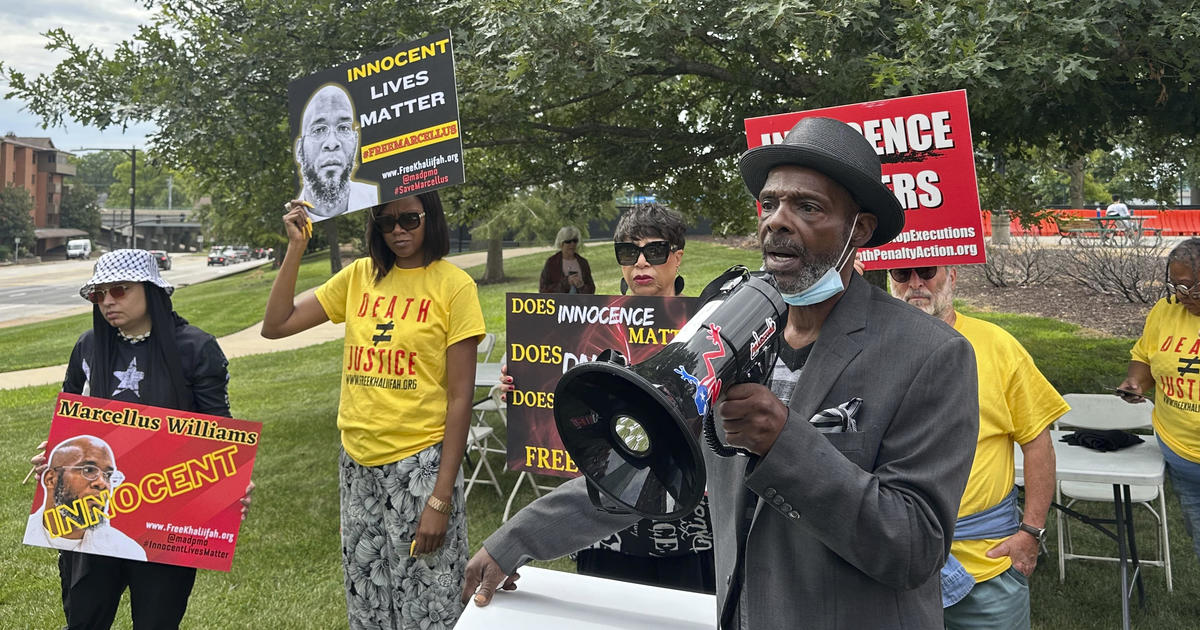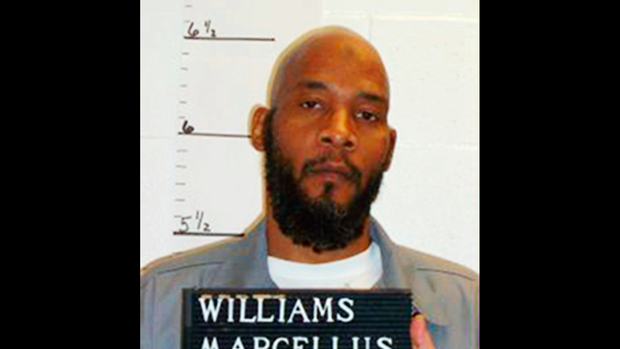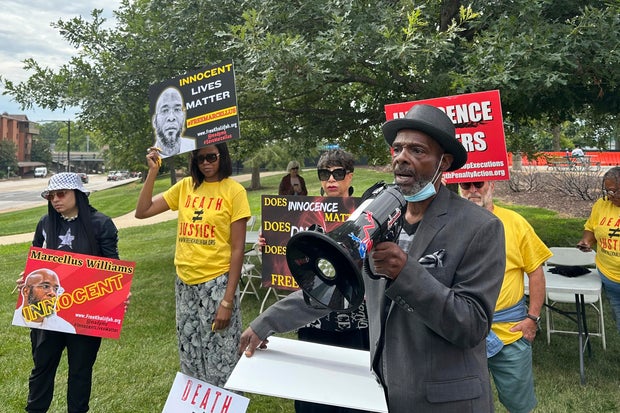A judge on Thursday declined to vacate the conviction and sentence of Marcellus Williams, a condemned inmate in Missouri whose execution is scheduled for later this month. Williams’ case has drawn national attention as he faces the death penalty over the stabbing death of a woman in 1998, despite doubts about DNA evidence on the knife used in the attack and longstanding questions about whether his original trial was fair.
“Every claim of error Williams has asserted on direct appeal, post-conviction review, and habeas review has been rejected by Missouri’s courts,” wrote St. Louis County Circuit Judge Bruce Hilton. “There is no basis for a court to find that Williams is innocent, and no court has made such a finding. Williams is guilty of first-degree murder, and has been sentenced to death.”
Attorneys for Williams, the St. Louis County Prosecuting Attorney’s Office and the Missouri Attorney General’s Office did not respond to messages left Thursday seeking comment. Williams’ lawyers are expected to request clemency from Republican Gov. Mike Parson and could appeal further.
The latest decision came after the Missouri Supreme Court in August blocked an agreement that could have spared Williams’ life, instead calling a hearing to proceed on his innocence claim. Williams, now 55, has since his conviction maintained his innocence in the killing of Lisha Gayle, a social worker and former reporter for the St. Louis Post-Dispatch, who was found stabbed to death in her home in August 1998. He is set to be executed by lethal injection on Sept. 24.
Missouri Department of Corrections via AP
Hilton presided over an evidentiary hearing last month challenging Williams’ guilt, following his approval of a plan that allowed Williams to enter a new no-contest plea to first-degree murder. The inmate’s lawyers at the time said that he maintained his innocence but the plea acknowledged that evidence was sufficient for a conviction.
In January, Democratic St. Louis County Prosecuting Attorney Wesley Bell cited questions about DNA evidence on the murder weapon in seeking a hearing to consider vacating Williams’ conviction. Bell said the evidence indicated that someone else’s DNA was on the butcher knife used to kill Gayle, and he had asked the judge to vacate Williams’ murder conviction based on that testing.
Bell brought the challenge under a 2021 Missouri law that allows prosecutors to ask a court to review a conviction they believe is unjust. That and the setting of an execution date saw Williams facing the prospect of everything from having his conviction overturned and being set free, to having it confirmed and facing pending execution.
Despite Bell’s motion, the Missouri Supreme Court in June set the Sept. 24 execution date. An initial August hearing date was set on the motion by Bell involving questions over that DNA evidence, but just before it was set to take place, a new report revealed that the DNA evidence was contaminated because officials in the St. Louis County Prosecuting Attorney’s Office touched the knife without gloves before the original trial in 2001.
With the DNA evidence spoiled, lawyers working on behalf of Williams from the Midwest Innocence Project reached a compromise with the prosecutor’s office: Williams would enter a new, no-contest plea to first-degree murder in exchange for a new sentence of life in prison without parole.
Hilton signed off on the agreement. So did Gayle’s family. But the Missouri Attorney General’s Office did not.
At Republican Attorney General Andrew Bailey’s urging, the Missouri Supreme Court blocked the agreement and ordered Hilton to proceed with the evidentiary hearing on Aug. 28.
An attorney for Williams, Jonathan Potts, said during the hearing that the mishandling of the murder weapon was devastating for Williams because it “destroyed his last and best chance” to prove his innocence.
Jim Salter / AP
Hilton, in his ruling, agreed.
“In light of this report, (Williams) cannot demonstrate that the genetic material on the knife handle can form a basis for a ‘clear and convincing showing’ of Williams’ innocence,” Hilton wrote.
Assistant Attorney General Michael Spillane said other evidence pointed to his guilt.
“They refer to the evidence in this case as being weak. It was overwhelming,” Spillane said at the hearing.
Prosecutors at Williams’ original trial said he broke into Gayle’s home on Aug. 11, 1998, heard water running in the shower, and found a large butcher knife. When Gayle came downstairs, she was stabbed 43 times. Her purse and her husband’s laptop were stolen.
Authorities said Williams stole a jacket to conceal blood on his shirt. Williams’ girlfriend asked him why he would wear a jacket on a hot day. The girlfriend said she later saw the laptop in the car and that Williams sold it a day or two later.
Prosecutors also cited testimony from Henry Cole, who shared a cell with Williams in 1999 while Williams was jailed on unrelated charges. Cole told prosecutors Williams confessed to the killing and offered details about it.
Williams’ attorneys responded that the girlfriend and Cole were both convicted felons out for a $10,000 reward.
Three other men — Christopher Dunn, Lamar Johnson and Kevin Strickland — have been freed after decades in prison under the 2021 Missouri law.
Williams has been close to execution before. In August 2017, just hours before his scheduled death, then-Gov. Eric Greitens, a Republican, granted a stay after reviewing the same DNA evidence that spurred Bell’s effort to vacate the conviction.
A rising star in Missouri Democratic politics, Bell defeated incumbent U.S. Rep. Cori Bush in a primary this month and is heavily favored in the November general election.
Williams is Black and at the hearing, the man who prosecuted him, Keith Larner, was asked why the trial jury included just one Black juror. Larner said he struck just three potential Black jurors, including one who he said looked like Williams.
Williams’ trial attorney, Joseph Green, told Hilton that when Williams was tried, he also was representing a man who killed his wife and injured several others in a St. Louis County courthouse shooting in 1992. That case took time away from working on Williams’ defense, Green said at the hearing.
“I don’t believe he got our best,” said Green, now a judge.


